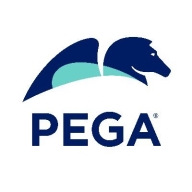

Pega Platform and SAP Signavio Process Manager are prominent competitors in the enterprise-level business process management category. Pega Platform has an edge in features with its robust case management and integration capabilities, while SAP Signavio excels in collaboration and visualization.
Features: Pega Platform offers impressive case management, a no-code interface, and the GetNextWork algorithm, supporting efficient task management. SAP Signavio Process Manager focuses on collaboration and usability, featuring a powerful Collaboration Hub and excellent process modeling for improved transparency.
Room for Improvement: Pega Platform needs improvements in UI design, cloud availability, and simplified low-code features for beginners. Pricing and licensing complexities are also concerns. SAP Signavio Process Manager requires enhanced user management, better integration and customization, and improved analytics and predictive tools.
Ease of Deployment and Customer Service: Pega Platform can be deployed on-premises, public, private, and hybrid clouds, but experiences with technical support vary. SAP Signavio Process Manager is praised for its accessible support across multiple deployment models, though better guidance in using the Collaboration Hub is desired.
Pricing and ROI: Pega Platform is priced at a premium, ideal for large enterprises, and offers notable ROI for complex operations. SAP Signavio Process Manager's pricing is high but competitive, providing good value through enterprise licensing options, supporting efficient process management.
The technical support from Pega is very low, rating a one or two out of ten.
I never needed support from the platform standpoint, but if additional features are required, we have regular meetings with the product team for feedback.
Pega's technical support team is very helpful.
Pega introduced Constellation, which allows a user to build a more engaging visual experience.
My learning curve in robotics has been challenging.
Pega is priced higher than open-source options like Flowable but is suitable for large-scale industries like banking and insurance.
The pricing is expensive, and this is an issue.
Management capabilities such as dashboards.
Pega Platform is excellent for enterprise-level solutions with integrations to entire systems, including case management, service orchestration, CRM, decision-making capabilities, digital process automation, and AI-driven functionalities.


Pega Platform facilitates business process management, case management, and workflow automation for industries like banking, insurance, and healthcare. It supports digital transformation and customer service enhancements with its low-code capabilities and seamless integrations.
Pega Platform enables users to create efficient systems for case management, financial operations, and digital transformations. It provides tools for client onboarding, quoting, claims processing, customer experience improvements, and content management. Pega's low-code approach allows for the automation of complex processes, making it suitable for enterprises looking for adaptability and rapid deployment. While it offers strong real-time analytics and decision automation, users acknowledge challenges in user interface, integration, and performance aspects. High costs and a learning curve need attention, and enhancements in AI features and cloud services are desired.
What are the key features of Pega Platform?In banking, Pega Platform automates loan processing, accelerates customer onboarding, and manages compliance. Insurance companies benefit from streamlined claims processing and policy management. Healthcare sectors use the platform for patient engagement and care coordination, enabling organizations to adapt quickly to changing industry requirements.
The Signavio portfolio of web-based business transformation solutions helps companies to understand and optimize all of their business processes quickly and at scale, providing instant insights for informed decision-making. Signavio’s intuitive analysis, change management and execution solutions around process excellence include use cases like digital transformation, operational excellence and customer-centricity, placing them at the heart of global organizations.
Over 1 million users in more than 1,500 organizations worldwide rely on Signavio products to make processes part of their company’s DNA. Headquartered in Berlin, Germany, Signavio was founded in 2009 to address the need for a collaborative approach to process management.
Signavio was acquired by SAP in the first quarter of 2021. For more information, visit www.signavio.com
We monitor all Business Process Management (BPM) reviews to prevent fraudulent reviews and keep review quality high. We do not post reviews by company employees or direct competitors. We validate each review for authenticity via cross-reference with LinkedIn, and personal follow-up with the reviewer when necessary.